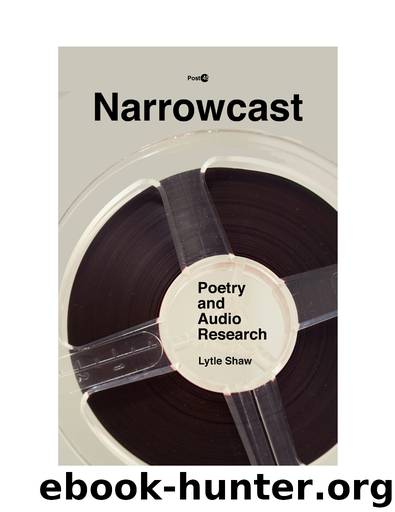Narrowcast by Shaw Lytle

Author:Shaw, Lytle [Shaw, Lytle]
Language: eng
Format: epub
Publisher: Stanford University Press
Published: 2018-04-14T16:00:00+00:00
4
The Strategic Idea of North
Glenn Gould, Sergeant Jones, and White Alice
Imperialism is the word used to refer to the extension of an empire or ideology to parts of the world remote from the source. It is Europe and North America which have, in recent centuries, masterminded various schemes designed to dominate other peoples and value systems, and subjugation by Noise has played no small part in these schemes. Expansion took place first on land and sea (train, tank, battleship) and then in the air (planes, rocketry, radio).
—R. Murray Schafer, The Soundscape
Frederick George Scott’s poem “Quebec” begins: “Like some grey warder who, with mien sedate.” Little known today, Scott (1861–1944) was, during his lifetime and shortly after, noted for his Christian, patriotic poetry; for his support of British imperialism (he enlisted to fight in World War I at more than fifty years old); and for his attachment to the Laurentian Mountains in southern Quebec.1 Taking exception to the “grey warder” line (which he does not deign to credit to a proper name or associate with a poem title), Robert Creeley goes on what we might hear today as something of an excessive rant against Canadian poetry as a whole:
Canadian poetry might always be this attempt, not so much to fit, say, into an environment but to act in the given place. If there is no “major” poet in Canada, if there never was one, etc., I think it is a part of this same problem. A theoretic embarrassment of “culture,” all the tenuosities of trying to be local and international at the same time, etc., take an energy otherwise of use in the making of an idiom peculiar to the given circumstances. In this way Canadian poetry, in its earlier forms, has much in common with the American poetry of Lowell, Longfellow, et al. The model is English, and it is precisely the English which is of no use whatsoever.2
One wonders how much Canadian poetry Creeley had actually read in 1953 when he made this comment and thus what gave him the sense that Scott might stand in for the nation’s output as a whole. It helps somewhat to know that this blurt was printed before the emergence of many of the better-known Canadian experimental poets of the 1960s and early 1970s. Fred Wah was fifteen years old; George Bowering, eighteen; Daphne Marlatt, eleven; bpNichol, nine; and Steve McCaffery, six. These are all poets that Creeley will later know and respect. A decade later, in 1963, Creeley will be at the Vancouver Poetry Conference, and from about that time on his work, like that of Olson, will be part of an international poetic dialogue with these Canadian poets.
This is perhaps somewhat surprising given the gauntlet Creeley laid down in his initial rant: “The impact of the place is dulled,” he continues, “in the overlay of the English rhythms, and the politeness which couldn’t have been actual.” Affectedly polite English rhythms mute poetry’s possible relation both to spatial and idiomatic dimensions of
Download
This site does not store any files on its server. We only index and link to content provided by other sites. Please contact the content providers to delete copyright contents if any and email us, we'll remove relevant links or contents immediately.
| African | Asian |
| Australian & Oceanian | Canadian |
| Caribbean & Latin American | European |
| Jewish | Middle Eastern |
| Russian | United States |
4 3 2 1: A Novel by Paul Auster(12391)
The handmaid's tale by Margaret Atwood(7763)
Giovanni's Room by James Baldwin(7346)
Asking the Right Questions: A Guide to Critical Thinking by M. Neil Browne & Stuart M. Keeley(5775)
Big Magic: Creative Living Beyond Fear by Elizabeth Gilbert(5771)
Ego Is the Enemy by Ryan Holiday(5447)
The Body: A Guide for Occupants by Bill Bryson(5096)
On Writing A Memoir of the Craft by Stephen King(4943)
Ken Follett - World without end by Ken Follett(4731)
Adulting by Kelly Williams Brown(4574)
Bluets by Maggie Nelson(4556)
Eat That Frog! by Brian Tracy(4540)
Guilty Pleasures by Laurell K Hamilton(4448)
The Poetry of Pablo Neruda by Pablo Neruda(4106)
Alive: The Story of the Andes Survivors by Piers Paul Read(4031)
White Noise - A Novel by Don DeLillo(4009)
Fingerprints of the Gods by Graham Hancock(4004)
The Book of Joy by Dalai Lama(3986)
The Bookshop by Penelope Fitzgerald(3852)
